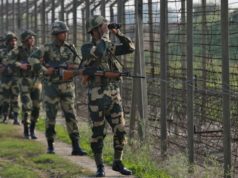Bangladesh Prime Minister Sheikh Hasina’s New Delhi visit might be postponed till April instead of February as was expected earlier. This date may even be shifted to later in the year if the two countries fail to reach a consensus on certain proposed agreements.
Delhi has sent drafts of 41 agreements and memorandums of understanding to Bangladesh to be signed by Sheikh Hasina during her India visit. India is keen to sign the security agreement on defense cooperation and the agreement to allow them use of Chittagong and Mongla ports, among other strategically important treaties.
Bangladesh wants to ensure the agreement of Teesta water sharing and the Ganges Barrage project. (Also read: West Bengal objects to BD’s Ganges Barrage too) However, due to objections from West Bengal, India’s central government cannot guarantee either the Ganges barrage project or the Teesta waster sharing agreement.
According to a local English daily in Bangladesh, Indian Foreign Secretary Jaishankar will arrive in Dhaka on 23 February to finalize the schedule of Prime Minister Sheikh Hasina’s visit. If negotiations between the two sides on those treaties look positive, then Sheikh Hasina may visit New Delhi early in April.
However, sources in New Delhi said, India wants to wrap up security agreements and all other agreements associated with transit decisively during this tour. If necessary, the visit can be further prolonged until everything is confirmed.
Policy makers in Dhaka thinks the draft on the security agreement that India’s defense minister Manohar Parrikar gave to Bangladesh’s defense advisor General (retired)Tareq Siddiqui is tough for the Bangladesh government to sign due to various reasons. The country’s security institutions have their own views. Similarly, certain important diplomatic quarters think such agreements could threaten regional balance. Additionally, if Sheikh Hasina government signs such sensitive agreements on security and completes all the procedures for proper transit to India, it will generate adverse public opinion. This will be harmful for the ruling party in case interim elections are held.
Delhi sources said, with all the regional tensions brewing in recent months, India feels the necessity to create a special defense relationship with its South Asian allies. India is considering establishment of a uniform command with these countries against regional threat or terrorism as well as a special assistance on military level with the Indian army. They think a greater understanding needs to be developed between the allies by holding regular joint exercises, training military aircraft and naval forces and collaboration of defense equipment. A similar proposal was given to Nepal.There was no formal response from Nepal in this regard.
Delhi’s main concern about Bangladesh is that their security forces have a regular supply of Chinese weapons and ammunition and now are purchasing sophisticated defense equipment like submarines from China. New Delhi wants to create some kind of obligation for defense equipment procurement through an agreement.
China is yet to show any formal response in this regard. However, a few sources mentioned that the country mostly wants to build a positive relationship for the sake of their own priorities without standing in the way defense ties with any third party.












